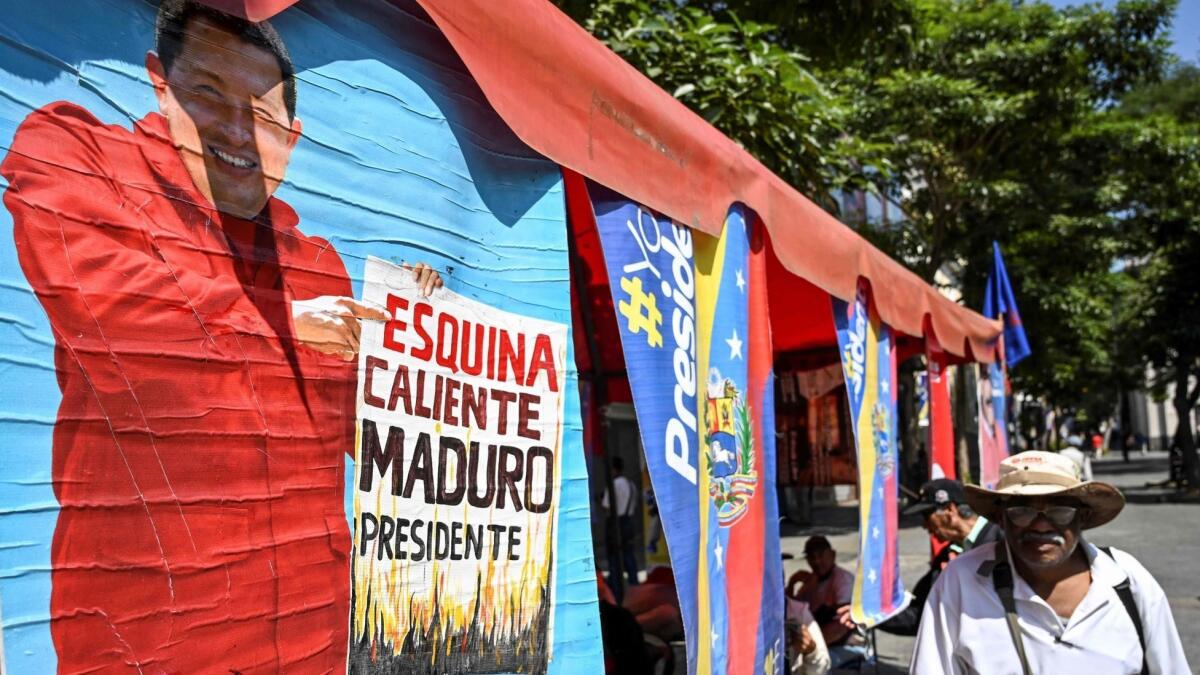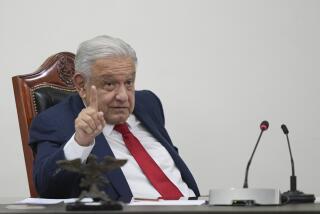Venezuela’s self-declared leader rejects outsiders’ help for negotiating with government

Reporting from Caracas, Venezuela — On the eve of the country’s latest scheduled mass opposition protests, Venezuela’s self-proclaimed interim leader on Friday rejected offers from Mexico and Uruguay to act as intermediaries in negotiations with the government of President Nicolas Maduro.
“The dictatorship of Nicolas Maduro has … laughed in the face of the Venezuelan people, denying the coveted political change that the Venezuelan people have sought incessantly,” Juan Guaido, the opposition leader, said in a letter to the presidents of Mexico and Uruguay.
The response was expected as Guaido has rebuffed the idea of negotiations and demanded that Maduro step down and that a transitional government be put in place and new elections be held.
Guaido, a 35-year-old federal lawmaker who was little known here before last week, declared himself the country’s interim president on Jan. 23, calling Maduro a “usurper” whose reelection last year was illegitimate. The United States, Canada, and other nations have recognized Guaido as the country’s acting head of state.
The center-left governments of Mexico and Uruguay continue to recognize Maduro as Venezuela’s lawful leader, saying they are remaining “neutral” in the conflict.
In his response to the two nations, Guaido said that remaining neutral “is to be on the side of a regime that has condemned thousands to misery, hunger, exile and death.”
Venezuela, once among the richest countries in Latin America, has been suffering from hyperinflation, shortages of food and medicine, rampant crime and large-scale emigration.
The opposition blames the problems on inept leadership and corruption in the administration of Maduro and his predecessor, the late Hugo Chavez, a longtime U.S. antagonist. Maduro blames a Washington-backed “economic war” against his socialist state for much of the country’s woes.
Maduro has rejected calls for him to resign, labeling Guaido’s emergence as part of a U.S.-orchestrated “coup” attempt meant to remove his government and grab the country’s vast oil riches. Maduro won a second presidential term last year in balloting boycotted by much of the opposition, which denounced the voting as fraud-ridden.
“We’re in a historic battle,” Maduro declared Friday in the latest of a series of visits to military bases, designed in part to shore up support amid the country’s armed forces, a powerful sector in Venezuela. “We’re facing the greatest political, diplomatic and economic aggression that Venezuela has confronted in 200 years.”
The country’s top military brass has thus far backed Maduro in the crisis, providing a crucial foundation of support for the embattled president.
The opposition has tried to win over the military with offers of amnesty.
The Trump administration — which has ramped up sanctions against Venezuela in a bid to pressure Maduro’s government to step down — has also rejected the idea of negotiations with Maduro.
Earlier this week, Maduro told Russia’s RIA Novosti news agency that he is willing to sit down and have talks with the opposition “for the sake of peace.”
In an appearance Friday before Venezuelan exiles in South Florida, Vice President Mike Pence dismissed the notion of talks.
“This is no time for dialogue,” Pence said a church in a Miami suburb. “It is time to end the Maduro regime.”
On Thursday, John Bolton, Trump’s national security advisor, said in a Twitter message that he wished Maduro and his aides would take “a long, quiet retirement, living on a nice beach somewhere far from Venezuela.”
The tough talk from Washington has fanned speculation here of a possible U.S. military assault on Maduro’s government.
But Bolton told the Hugh Hewitt radio show on Friday that military intervention in Venezuela was not imminent and that the U.S. objective was a “peaceful” transfer of power.
The Trump administration has warned that Maduro’s government could face “serious consequences” should any harm come to Guaido.
Guaido is under criminal investigation here and has been barred from leaving the country.
For his part, the opposition leader has called for a new round of mass street protests on Saturday. Supporters of the Maduro government, meanwhile, are planning a counter-march.
While facing growing international pressure from Washington, Maduro has retained the backing of China and Russia, both major lenders to Venezuela.
On Friday, a Chinese government spokesman said that Beijing officials were in contact with both Maduro and Guaido, in a bid to reach a peaceful outcome.
The Ministry of Foreign Affairs spokesman Geng Shuang said China supported moves to establish peace talks that could reach a deal.
“China has been maintaining close contact with all parties through various means,” said Geng at a regular ministry briefing Friday. “China has noted that on many occasions we called on all parties to engage in peaceful dialogue.”
China, one of Venezuela’s closest allies, last week voiced opposition to foreign interference and support for Venezuela’s efforts to “maintain its sovereignty, independence and stability.”
Times staff writers Robyn Dixon in Beijing and Patrick J. McDonnell also contributed to this report.
More to Read
Sign up for Essential California
The most important California stories and recommendations in your inbox every morning.
You may occasionally receive promotional content from the Los Angeles Times.










